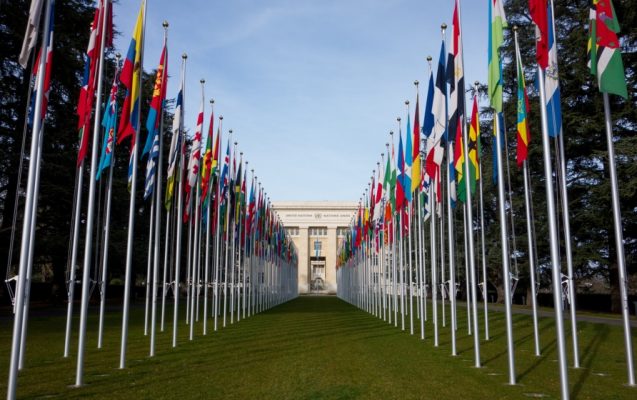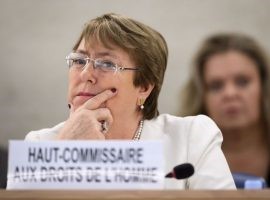Geneva, Switzerland – From 24 June to 12 July 2019, Americans for Democracy & Human Rights in Bahrain (ADHRB) participated in the 41st Session of the United Nations (UN) Human Rights Council (HRC). During the session, ADHRB highlighted various human rights violations committed by the Governments of Bahrain, Saudi Arabia, the United Arab Emirates (UAE), Oman, and other Gulf Cooperation Council (GCC) states. ADHRB delivered 21 interventions, hosted two successful side events on Bahrain, and Oman and the UAE, and supported successful side events on Saudi Arabia and Yemen. Many of the concerns ADHRB raised before the Council were echoed by UN officials, NGO representatives, and State delegations. In addition to engaging with the Council, ADHRB engaged with the Human Rights Committee concerning the obligations of the Netherlands under the International Covenant on Civil and Political Rights (ICCPR) to not return a Bahraini citizen Ali Mohamed AlShowaikh to Bahrain due to fears regarding his torture. ADHRB also held a solidarity stand outside the Council to call attention to the plight of activists in Bahrain, urging the release of political opposition figures and human rights defenders.
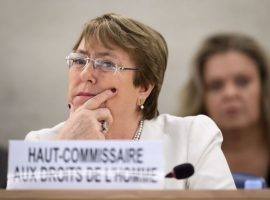
On Monday 24 June, the first day of the session, ADHRB delivered an oral intervention during the Item 3 Clustered Interactive Dialogue with the Independent Expert on sexual orientation and gender identity and the Special Rapporteur on the independence of judges and lawyers. In the intervention, Ms. Clara Sanchez Lopez raised concerns about Bahrain’s lack of a fair and impartial legal system, an issue exemplified by the ability of members of the ruling AlKhalifa family to preside over cases. Sanchez Lopez concluded her statement by asking Special Rapporteur Garcia-Sayán what recommendations could be given to states like Bahrain whose judiciary branches of government are corrupted by nepotism.
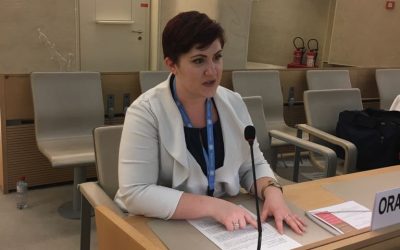
On Tuesday 25 June, during the Item 2 General Debate with the High Commissioner on Human Rights, ADHRB delivered two interventions. In the first intervention, Ms. Bridget Quitter broached concerns about statelessness in Bahrain, and the government’s elimination of civil society space, dissolution of major opposition political groups, and closure of the last remaining independent newspaper. Quitter highlighted that amidst generalized suppression, Bahrain has recently taken more extensive measures to criminalize dissent, and to target social media and online activism. She thus urged the Council and the High Commissioner to hold Bahrain accountable for its rights abuses by invoking General Assembly resolution 60/251 in order to expel Bahrain from the Human Rights Council.
Mr. Pry delivered ADHRB’s second intervention during the Item 2 General Debate with the High Commissioner. In his remarks, he addressed Saudi Arabia’s targeting of women human rights defenders. He stated that due to their activism following the lifting of the ban on women driving in June 2018, the Saudi government arrested, tortured, and imprisoned several women because of their activism.. Pry also raised concerns over Saudi Arabia’s ongoing use of capital punishment, highlighting the recent execution of 37 individuals, a case condemned by the High Commissioner in her remarks . Pry concluded by highlighted the cases of Ali AlNimr, Dawood AlMarhoon, and Abdullah AlZaher, who are currently at imminent risk of execution.
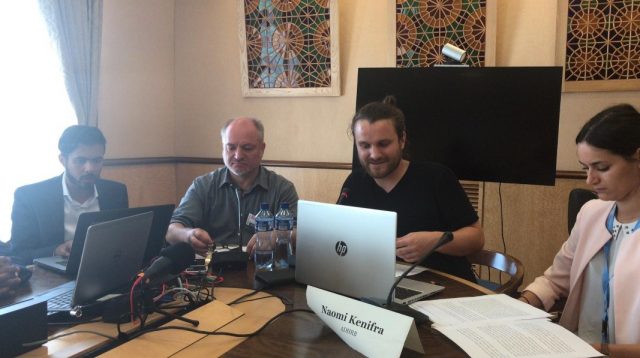
On Tuesday 25 June, ADHRB participated in a side event on the human rights situation in Yemen. Mr. Mathias Tretschog, a freelance journalist and founder of the peace project Stop the WAR in Yemen moderated the panel, while Dr. Taha al-Mutawakel, the Yemeni Minister of Health provided video remarks, Mr. Yahya AlSharafi, an activist with the Insan Organisation for HUMAN Rights and Peace and Ms. Naomi Kenifra, a human rights advocate with ADHRB spoke. The event focused on the deteriorating health situation in Yemen. Panelists discussed the dire situation of the healthcare system in Yemen, which is near destruction. The poor health situation in the country has been exacerbated by the high number of children who are reportedly on the verge of starvation: 85 000 children by some counts. This situation has been further affected by coalition’s imposition of a blockade on the Red Sea port of Hodeidah, which has caused an extreme lack of food and basic necessities. This has been further compounded by an aerial blockade of Sana’a’s International Airport. Even as the health situation deteriorates, the Saudi and Emirati-led coalition has deliberately struck healthcare facilities.

On Wednesday 26 June, Mr. Brian Dooley delivered an oral intervention during the Item 3 Interactive Dialogue with the Special Rapporteur on peaceful assembly and association and the Special Rapporteur on freedom of expression. In his speech, Dooley raised concerns about Bahraini authorities’ widespread targeting of activists who criticize the government in Bahrain. He called on Bahrain to take concrete steps to guarantee the right to free assembly to its people.
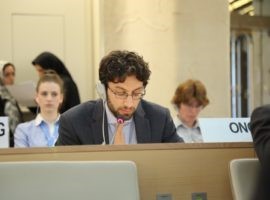
On Thursday 27 June, Pry delivered another oral statement, this time under the Item 3 Interactive Dialogue with the Special Rapporteur on migrants and the Independent Expert on international solidarity. In his speech, Pry, discussed the systematic and widespread abuse and exploitation migrant workers in the UAE experience under the auspices of the kafala system. As an example, he raised the case of eight migrant workers who were locked in a cage by their Emirati employer during the 2019 Asian Football Cup.
On Thursday 27 June, ADHRB co-sponsored a side event, hosted by ARTICLE 19, that examined ways to end impunity in Saudi Arabia, including what steps the UN could take in this direction. The discussion focused around the Khashoggi case. The speakers included Dr. Agnes Callamard, the UN Special Rapporteur on extrajudicial executions, Mr. Pieter Omtzigt, Special Rapporteur at the Council of Europe, Mr. David Kaye, the UN Special Rapporteur on the right to freedom of opinion and expression, Mr. Rob Mahoney, the Deputy Executive Director of the Committee to Protect Journalists, and Mr. Yahya Assiri, the founder and Director of ALQST.
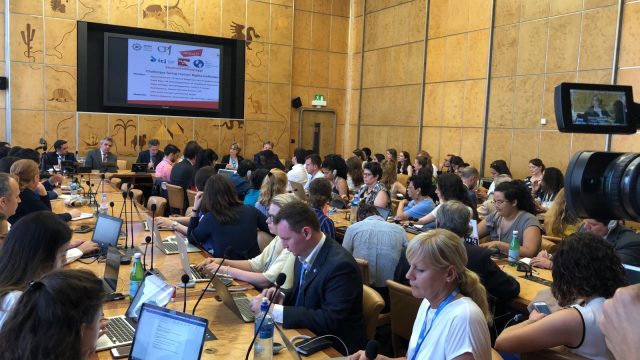
On Friday 28 June, Gabriella Bangar delivered an oral intervention during the Annual Full Day Discussion on the Human Rights of Women which focused on the rights of older women. In her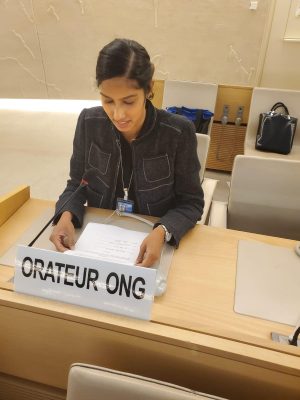 intervention, Bangar drew attention to the challenges that many countries face when establishing social and economic programs for elderly women. She also highlighted the need to take further steps, multilaterally and internationally, to address this issue.
intervention, Bangar drew attention to the challenges that many countries face when establishing social and economic programs for elderly women. She also highlighted the need to take further steps, multilaterally and internationally, to address this issue.
On Friday 28 June, ADHRB delivered a second intervention during the Annual Full-Day Discussion on the Human Rights of Women. In the intervention, ADHRB discussed the issue of violence against women in the work place. The intervention highlighted the plight of migrant workers in the Gulf Cooperation Council, and their vulnerability at the hands of their employers. In particular, the speech examined the condition of migrant domestic workers who suffer from abuses, because they work in their employers’ homes.
On Monday 1 July, on the margins of the HRC, ADHRB participated in the 126th session of the UN Human Rights Committee review of the Netherlands. Ahead of the session and the review, ADHRB submitted an assessment of the Netherlands’ compliance with its treaty obligations under the ICCPR. ADHRB’s report evaluates the Netherlands’ involvement and culpability in Ali Mohamed AlShowaikh’s case.
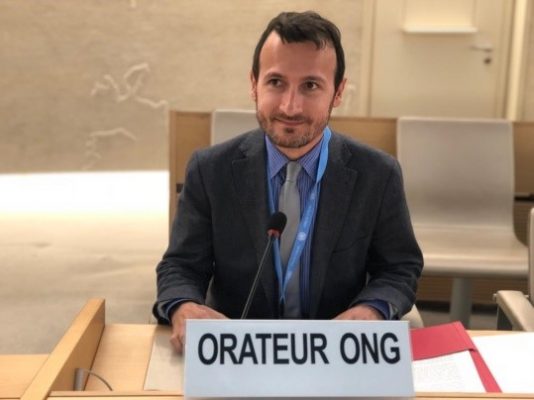 AlShowaikh, a Bahraini citizen, participated in the February 2011 protests calling for democracy and human rights. He fled Bahrain, fearing to be targeted because of his brother’s political activism. He sought asylum in the Netherlands, but the Dutch government rejected his asylum request as well as his demand to be deported to “any other country” but Bahrain. On the contrary, the Dutch government deported him to Bahrain on 20 October 2018. He was immediately arrested after arriving by airport police officers. In Bahrain, he was forcibly disappeared, tortured into confessing, tried under Bahrain’s counter-terror law, and sentenced to life in prison, stripped of his nationality, and fined 500 Bahraini dinars.
AlShowaikh, a Bahraini citizen, participated in the February 2011 protests calling for democracy and human rights. He fled Bahrain, fearing to be targeted because of his brother’s political activism. He sought asylum in the Netherlands, but the Dutch government rejected his asylum request as well as his demand to be deported to “any other country” but Bahrain. On the contrary, the Dutch government deported him to Bahrain on 20 October 2018. He was immediately arrested after arriving by airport police officers. In Bahrain, he was forcibly disappeared, tortured into confessing, tried under Bahrain’s counter-terror law, and sentenced to life in prison, stripped of his nationality, and fined 500 Bahraini dinars.
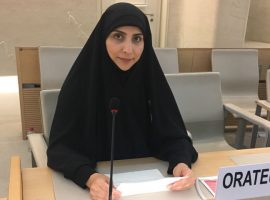 Also on Monday 1 July, ADHRB delivered several interventions, the first of which took place during the Item 3 General Debate. The intervention addressed the ongoing targeting of women human rights defenders in reprisals by the Bahraini government. In particular, the intervention highlighted Hajer Mansoor, Najah Yusuf, and Medina Ali’s cases. Mansoor, Yusuf, and Ali were arbitrarily arrested, tortured, coerced to confess and imprisoned. While in prison, they have been denied private visits. As a result, they have not seen their children for about three hundred days.
Also on Monday 1 July, ADHRB delivered several interventions, the first of which took place during the Item 3 General Debate. The intervention addressed the ongoing targeting of women human rights defenders in reprisals by the Bahraini government. In particular, the intervention highlighted Hajer Mansoor, Najah Yusuf, and Medina Ali’s cases. Mansoor, Yusuf, and Ali were arbitrarily arrested, tortured, coerced to confess and imprisoned. While in prison, they have been denied private visits. As a result, they have not seen their children for about three hundred days.
ADHRB delivered another oral intervention during the Item 3 General Debate, expressing dismay about the Saudi and Emirati-led coalition’s blockade on Yemen. According to the UN, the blockade is a “grave breach of the most basic norms of human rights law, as well as the law of armed conflict”. Due to the effect of the blockade, ADHRB noted the importance of continuing to pay public sector salaries and pensions, as it allows many Yemenis to provide for their families.
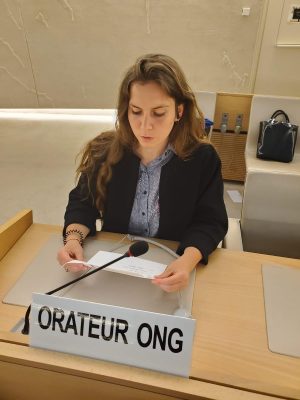 Also on Monday 1 July, ADHRB delivered a statement concerning the ongoing humanitarian crisis in Yemen concerning the alarming conditions of internally displaced persons. In the intervention, ADHRB noted that since the beginning of the conflict, more than 4 million people have been displaced, and many of them lack medical care and food. The statement called attention to the threat of preventable diseases, in particular cholera. In addition to preventable diseases, poor weather conditions have negatively affected the conditions of displaced persons in Yemen. Despite these factors, the parties involved in the conflict have diverted critical food aid from an estimated 10 million civilians, leaving many on the brink of famine.
Also on Monday 1 July, ADHRB delivered a statement concerning the ongoing humanitarian crisis in Yemen concerning the alarming conditions of internally displaced persons. In the intervention, ADHRB noted that since the beginning of the conflict, more than 4 million people have been displaced, and many of them lack medical care and food. The statement called attention to the threat of preventable diseases, in particular cholera. In addition to preventable diseases, poor weather conditions have negatively affected the conditions of displaced persons in Yemen. Despite these factors, the parties involved in the conflict have diverted critical food aid from an estimated 10 million civilians, leaving many on the brink of famine.
That same day, ADHRB delivered another oral statement, this one concerning Bahrain’s increasing implementation of mass trials. Over the past two years, there have been five mass trials, leading to the conviction of 505 individuals. In May 2018, 115 people were charged with participating in a group the government calls the “Zulfiqar Brigades.” In February 2019, 167 people were convicted in a mass trial for a non-violent sit-in in Duraz village. In May 2017, security forces attacked the non-violent protestors killing five people and arresting 286. In April 2019, 139 people were denationalized for their alleged participation in an alleged terrorist cell the government called the “Bahraini Hezbollah.” However, thanks to international pressure, including from the High Commissioner, 551 people had their citizenship reinstated, although many remain imprisoned for life or on other long-term convictions.
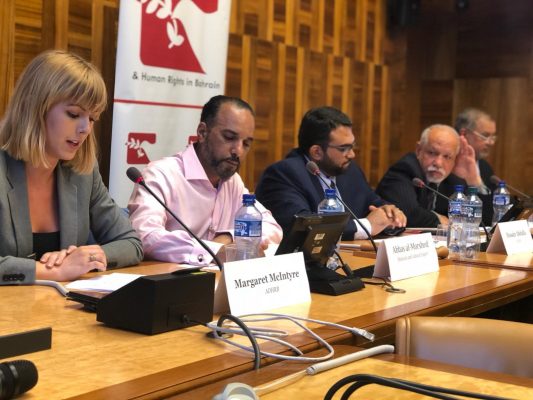
On Monday 2 July, ADHRB hosted a side event on the effects of repression on political, social, cultural, and religious life in Bahrain. The panel was moderated by Mr. Husain Abdulla, Executive Director of ADHRB, and featured remarks by Dr. Saeed Shehabi, a veteran political activist with the Bahrain Freedom Movement, Dr. Jalal Fairooz, a former Bahraini Member of Parliament, Mr. Abbas al-Morshed, a historian and cultural expert, and Ms. Margaret McIntyre, of ADHRB. The panelists discussed the AlKhalifa family’s oppressive influence on democracy and civil society and called attention to restrictions on free expression and association, the lack of independent media, denationalizations of dissidents, and reprisals against human rights defenders.
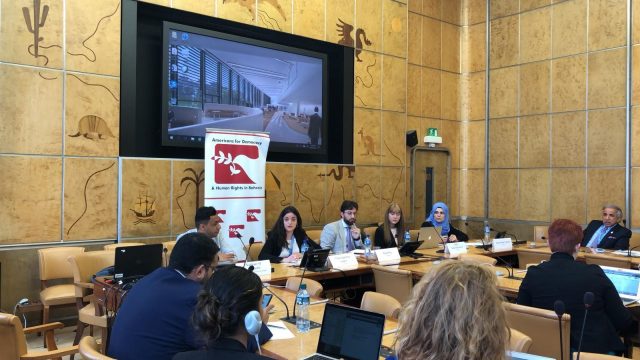 On 3 July 2019, ADHRB hosted a side event tackling the poor human rights records in the UAE and Oman, characterized by the suppression of fundamental freedoms, arbitrary arrests, enforced disappearances, and restrictive civil and political society environment. Mr. Pry, of ADHRB moderated the panel, while Mr. Nabhan Al Hanashi, of the Omani Centre for Human Rights, Ms. Imene Ben Younes, of the International Center for Justice and Human Rights,, Ms. Clara Sánchez Lopéz, of ADHRB, and Ms. Sofia Kaltenbrunner of the International Campaign for Freedom in the UAE spoke. Panelists discussed the situation in the UAE, characterizing it as a “police state” due to the high level of surveillance, in particular dissidents and activists. Panelists also highlighted the Omani government’s human rights violations, in particular, the promulgation of strict free expression laws, the closure of newspapers, and the jailing of journalists.
On 3 July 2019, ADHRB hosted a side event tackling the poor human rights records in the UAE and Oman, characterized by the suppression of fundamental freedoms, arbitrary arrests, enforced disappearances, and restrictive civil and political society environment. Mr. Pry, of ADHRB moderated the panel, while Mr. Nabhan Al Hanashi, of the Omani Centre for Human Rights, Ms. Imene Ben Younes, of the International Center for Justice and Human Rights,, Ms. Clara Sánchez Lopéz, of ADHRB, and Ms. Sofia Kaltenbrunner of the International Campaign for Freedom in the UAE spoke. Panelists discussed the situation in the UAE, characterizing it as a “police state” due to the high level of surveillance, in particular dissidents and activists. Panelists also highlighted the Omani government’s human rights violations, in particular, the promulgation of strict free expression laws, the closure of newspapers, and the jailing of journalists.
On 3 July, ADHRB delivered an oral intervention during the Item 4 General Debate concerning the widespread use of torture in UAE prisons and in territories run by soldiers supported by the UAE. The intervention highlighted the torture of Emirati human rights defenders and prominent activists, including Dr. Nasser Ghaith, Ahmed Mansoor, and Amina Saeed. The intervention also drew attention to credible reports regarding systematic torture and sexual torture in UAE-run prisons in Yemen. Moreover, the intervention notes that UAE forces in Yemen have launched airstrikes on civilians, raped civilians and employed child soldiers, causing the deaths of hundreds of innocent civilians, constituting war crimes.
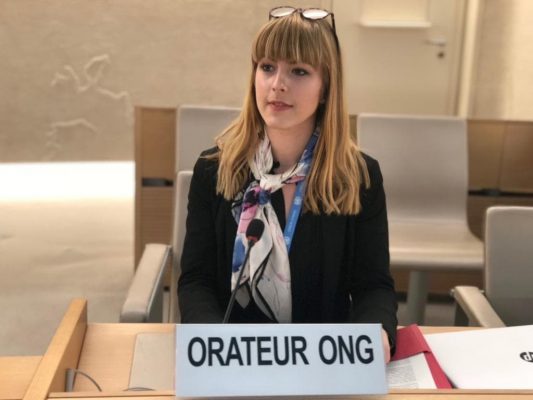 ADHRB’s second intervention on 3 July was delivered by Ms. Margaret McIntyre, under the Item 4 General Debate. In the intervention, McIntyre drew attention to Saudi Arabia and the UAE’ efforts to silence dissent and democratic action domestically and abroad. She noted that within Saudi Arabia, the government arbitrarily detains, tortures, and executes critics. Abroad, Saudi Arabia is responsible for helping to suppress popular movements in Yemen and Bahrain. McIntyre also addressed efforts by the UAE to silence dissent, target critics and activists, promulgate repressive laws, and support militias in Yemen and Libya.
ADHRB’s second intervention on 3 July was delivered by Ms. Margaret McIntyre, under the Item 4 General Debate. In the intervention, McIntyre drew attention to Saudi Arabia and the UAE’ efforts to silence dissent and democratic action domestically and abroad. She noted that within Saudi Arabia, the government arbitrarily detains, tortures, and executes critics. Abroad, Saudi Arabia is responsible for helping to suppress popular movements in Yemen and Bahrain. McIntyre also addressed efforts by the UAE to silence dissent, target critics and activists, promulgate repressive laws, and support militias in Yemen and Libya.
Also on 3 July, ADHRB delivered two interventions under the Item 5 General Debate. In one of the interventions, Ms. Naomi Kenifra called the Council’s attention to systematic and widespread human rights violations committed by Saudi Arabia, a Member State on the Council and the United Arab Emirates. Despite its role in leading UN human rights bodies, Saudi Arabia has engaged in widespread human rights abuses, especially during the war in Yemen. In Yemen, Saudi Arabia is responsible for bombing civilian targets, while within the kingdom, it continues to carry out executions, including most recently in April 2019. The UAE, which was previously a member of the Council, continues to have obligations to promote and protect human rights. Despite this, it continues to commit systematic rights abuses, including in Yemen where it supports militias that engage in widespread torture and sexual abuse. Domestically, the government targets and imprisons activists and human rights defenders.
ADHRB’s second intervention under the Item 5 General Debate was delivered by Ms. Angela Abou Ghazaleh. In her remarks, she called on the HRC to invoke UN General Assembly Resolution 60/251 in order to eject Bahrain from the Council due to its disregard for human rights. In particular, Ghazaleh noted Bahrain’s efforts to secure the extradition of refugee Hakeem AlAraibi from Thailand and its 31 December 2018 upholding of human rights defender Nabeel Rajab’s prison sentence on spurious charges. She further highlighted Bahrain’s use of citizenship revocation, which authorities use as a tool against dissidents and critics of the government.
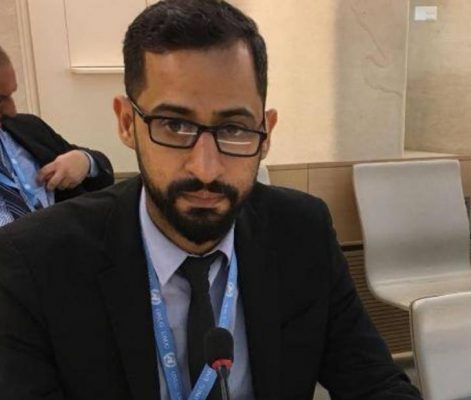
On Thursday 4 July, Mr. Yusuf Alhoori delivered an intervention in Arabic during Yemen’s review under the Universal Periodic Review (UPR) mechanism. He highlighted the Hadi government’s failure to comply with its UPR recommendations. His intervention also drew attention to the Yemeni government’s disregard for human rights in the ongoing conflict.Ms. Salma Moussawi also delivered an intervention during Yemen’s UPR review, in which she highlighted the Hadi government’s failure to protect the human rights of its citizens. She discussed the lack of concern for civilian safety and the absence of protection for civilians from airstrikes, blockades, and famine. She concluded her remarks with a call to hold all of the parties responsible for the situation in Yemen accountable.
On 5 July, ADHRB delivered an oral intervention during the Item 6 General Debate, during which it drew the Council’s attention to Saudi Arabia’s failure to comply with its UPR recommendations from the recent 3rd cycle in November 2018. In the intervention, ADHRB underlined the Saudi government’s continued implementation of capital punishment. Later on 5 July, Ms. Costanza Mendola delivered another oral intervention, in which she addressed the failure of the Bahraini government to comply with the UPR recommendations it received in 2017. She called particular attention to the government’s continued harassment and incarceration of human rights defenders and political opponents, its continued repression of the rights to free expression, association, and assembly. She highlighted that additional steps to restore the National Security Agency’s arrest powers, re-empower military courts to try civilians, and to promulgate a law that further restricts freedom of expression and opinion, have led to increased repression.
